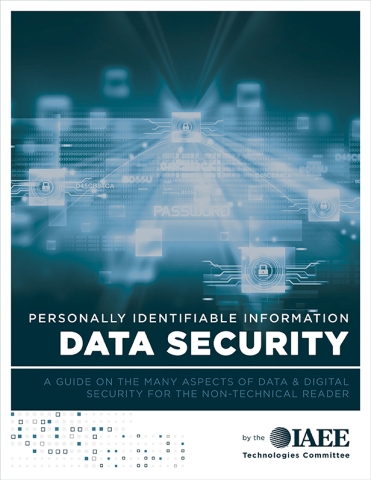IAEE, CEIR Release Research Reports on Data Security, Marketing Spend

Two leading event industry associations recently have released important research reports this month.
The International Association of Exhibitions and Events released Personally Identifiable Information – Data Security, a 17-page report that provides a thorough overview of various aspects and considerations regarding personally identifiable information (PII) for the non-technical reader.
“How data is handled should be a high-level priority for all exhibition industry organizations,” said David DuBois, IAEE president and CEO. “Understanding the importance of PII and the many considerations in securing the safety of your organization’s systems is complex.”
He added, “Our goal is for this report to serve as a helpful resource for both IT staff, as well as the layperson, in understanding what PII is and steps to take in protecting data.”
Resulting from the collaborative work of the Personally Identifiable Information (PII) subcommittee within the IAEE Technologies Committee, the Personally Identifiable Information – Data Security report addresses the following topics:
• Types of Data and Categorization
• Governance and Training
• Data Ownership
• Identity Access and Management
• Integrations
• Data in Motion
• Data at Rest
• Internal Security Controls
• Onsite Considerations
“To everyone but the most experienced security professional, cybersecurity seems like the Wild West cloaked in a unique language of its own,” said Brian Scott, IAEE Technologies Subcommittee – PII Data Security Chairperson and CIO of Experient.
He continued, “With the critical nature of these risks, it’s important that every professional have at least a cursory understanding of the concepts included under the wide umbrella of information security. To help IAEE members understand these concepts, I was pleased to lead a subcommittee of the Technologies Committee to consolidate and explain the basic fundamentals of data security.”
As a service to the exhibitions and events industry, IAEE is making this important report available free of charge.
Click HERE to download Personally Identifiable Information – Data Security from the IAEE website.
Meanwhile, the Center for Exhibition Industry Research (CEIR) released its 2018 Marketing Spend Decision Report, new research that tracks how much of exhibitor marketing budgets B2B exhibitions capture.
“This report shows the continued strength of B2B exhibitions,” said Cathy Breden, CEO of CEIR. “It is the face-to-face marketing channel of choice for brand marketers that use it.”
She continued, “The report offers exhibitors and exhibition organizers valuable metrics. In addition to profiling the complete marketing channel mix among brand marketers that exhibit, it also includes other important metrics that indicate movement in the market that stakeholders need to understand to effectively respond.”
The report reveals that while the B2B exhibition channel captures the largest share of exhibitor marketing budgets, budgets are stagnant. This issue, coupled with the documented increase in the median number of exhibitions participated in, finds median spending per exhibition has not increased since last reported in 2015. Taking inflation into consideration, spending has declined marginally.
Looking forward to 2018, the number of exhibitions participated in is expected to hold, while positive movement in net square footage (NSF) is expected to come from more exhibitors planning to increase their booth size rather than adding exhibitions to their 2018 event schedule.
The 2018 Marketing Spend Decision Report profiles B2B exhibitors by:
• Top-ranked important objectives for exhibiting
• Success metrics to evaluate the outcome of exhibiting
• Marketing spend allocation across all marketing channels
• Digital tactics used among those allocating marketing dollars to digital channels
• Number of exhibitions participated in 2015 and projections through 2018
• Typical booth sizes from 2015 and projections through 2018
• Median spending per exhibition estimate
The report also highlights differences by specific demographics including annual revenues, annual marketing budgets, booth size and specific CEIR sectors.
Online survey results are based on a study CEIR conducted during the spring of 2017, which polled a sampling of exhibitors from lists provided by Freeman, GES, Fern Expositions, Hargrove and Shepard Exposition Services. A total of 424 exhibitors responded.
Click HERE to download the full 2018 Marketing Spend Decision Report.


Add new comment